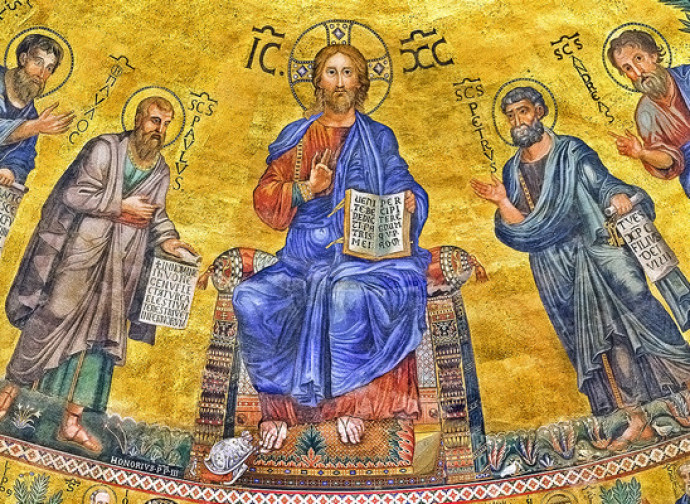Feast of Christ the King, an antidote to secularism
Introduced by Pius XI in 1925, this festivity which closes the liturgical year is more topical than ever: it is an invitation to wake up and shun accommodation to the worldly spirit.

The liturgical year closes with the Solemnity of Jesus Christ King of the Universe, introduced by Pius XI with the encyclical 'Quas primas' on 11 December 1925, to crown the Jubilee of that year, a 'Jubilee of Peace' after the sad events of the First World War. Originally placed on the last Sunday in October, the Solemnity was moved to the last Sunday of the liturgical year with the Second Vatican Council. The feast day was also adopted by the Lutheran and Anglican denominations. The preface of the Mass defines Christ's as 'an eternal and universal kingdom, a kingdom of truth and life, a kingdom of holiness and grace, a kingdom of justice, love and peace'. Does speaking of Christ's kingship still make sense today, and if so, how can it be brought to life in our post-Christian society that is increasingly independent of any reference to God and Christ? Do the reasons that drove Pius XI, at the request of pastors and faithful, to establish it still apply today?
The aforementioned encyclical "Quas primas" emphasised the commitment of Catholics in society to accelerate and hasten the return to the social kingship of Christ and explained the reason: to oppose "a most effective remedy to that plague, which pervades human society, the plague of so-called secularism, with its "errors and impious incentives". The aim was therefore to counter the birth and growth of an atheistic and secularised society, which the Pope called the 'plague of our time'. He went on to note that the evils of the world derive from having distanced Christ "and his holy law" from the practice of daily life, from the family and from society, and therefore hope for lasting peace among peoples is impossible as long as individuals and nations continue to deny and reject "the empire of Christ the Saviour". It is therefore necessary - the Pope concludes - "to establish the Kingdom of Christ and proclaim Him King of the Universe".
On closer inspection, beyond the language of the time, the analysis that Pius XI made of society appears to be extremely topical, an analysis that today helps us to realise that, in the name of an ever more reaffirmed autonomy, contemporary humanity seems to voluntarily choose to do without God. Let us listen again to these words of Pius XI: "If we command that Christ the King be venerated by all the Catholics of the world, we shall thereby provide for the needs of the present times, bringing a most effective remedy to that plague which pervades human society". He was referring to so-called 'secularism with its errors and impious incentives'. Then as now, an undeniable fact emerges: faith is becoming more and more diluted, to the point of becoming irrelevant in the conception of life and in the choices of our societies; even Christians sometimes renounce being salt and evangelical leaven in the dough of this world, and many seem to shut themselves up in their own enclosures, almost reluctant to face the great challenges of contemporary times.
The feast of Christ the King can be a stimulus for Catholics to wake up from the slumber of indifference and accommodation to the worldly spirit; a push to convert to the courage of evangelical witness in every sphere of society. If yesterday the 'plague' was secularism, today the 'plague' is indifference, disengagement, the uncritical acceptance of everything as if there were no longer any difference between good and evil. The heroism of the martyrs, the Church's imperishable wealth, is always indispensable to go against the tide, ready to risk even one's life when it comes to bearing witness to Christ. Pretentious is the polemic of those who consider the image of Jesus the King as if we Christians wanted to impose our convictions on others. The recipients of this feast are we Catholics, the Church as a whole, urged by the Holy Spirit to consider Christ our King and Lord: in fact, it is only through our faithfulness to the Gospel that Christ's message can reach everyone, believers and non-believers alike.
Christ is the Alpha and the Omega, (Rev 21:6); before Pilate, he categorically affirmed his kingship, answering his question: "So you are king?", "You say it, I am king" (Jn 18:37). His kingdom, Pius XI explained, "primarily spiritual" is contrasted solely with that of Satan and the powers of darkness. Kingdom, therefore, not of this world, because it does not come from men, but from God alone. From his subjects this King requires, Pius XI continues, not only a soul detached from riches and earthly things, meekness of morals, hunger and thirst for justice, but also to deny themselves and take up their cross to follow him. This Kingdom of Christ is already present on earth, but in mystery - the Second Vatican Council also reminds us of this in the pastoral constitution "Gaudium et spes" (nn19-22; 33-39) - however, it will come to full perfection at the end of time with the coming of the Lord, the Supreme Judge and King, to judge the living and the dead (Mt 25:31 ff).
* Bishop emeritus of Ascoli Piceno (Italy)
